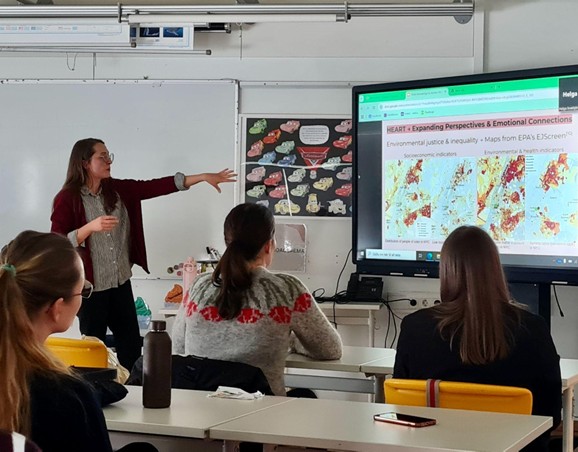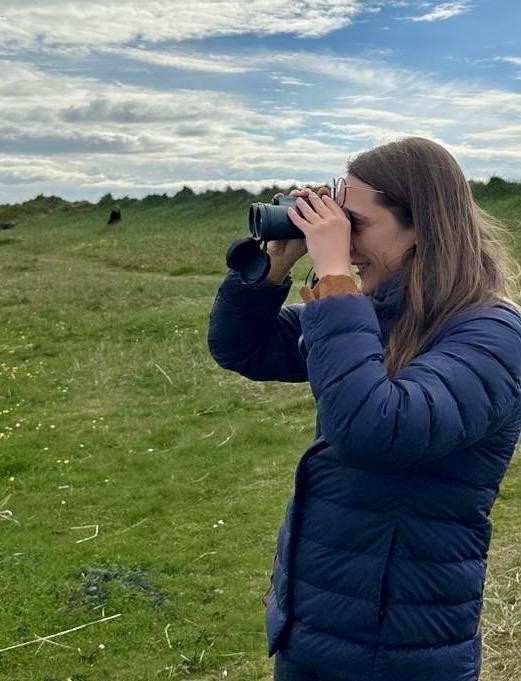Reflections from Iceland: A Fulbright Teacher Exchange Experience

Sabrina presenting at the Natural Science Teacher Conference in Sandgerði in March 2025
By Sabrina Miller
Sabrina Miller is a high school biology teacher at East Side Community High School in New York and the first recipient of the Fulbright Distinguished Award in Teaching Research to Iceland.
In spring 2025, I began my journey as the first Fulbright Distinguished Awards in Teaching Research grantee in Iceland. Arriving in frigid January, I was warmly welcomed by the Fulbright Commission and my fellow grantees. Now, as many of us prepare to return to the U.S., I feel deeply grateful for the lifelong friendships and professional connections I’ve made.
During the first few months of my five-month research grant, I visited schools throughout Reykjavík to observe classrooms – primarily in grades 8 to 10 – and to engage with teachers and students. I conducted interviews with educators about their curricula and instructional practices, and I spoke with students about their views on climate change, their connection to nature, and their sustainability attitudes and behaviors. I also had the opportunity to travel to Akureyri, where I toured the university and observed classes in four primary schools.
While in Iceland, I embraced the dual roles of teacher-researcher and student-learner. I audited a sustainability course at the University of Iceland, where I learned about Iceland’s efforts to meet the United Nations’ Sustainable Development Goals (SDGs) for 2030. I also took Icelandic language classes at the local library, hiked on a glacier for the first time, identified 24 new “lifer” bird species, and – thanks to the guidance of my Icelandic fitness coaches – achieved personal records in deadlifts (105 kg) and back squats (77 kg).
As I finalize my data analysis from structured interviews and student surveys, I am now developing a curriculum to share with my education networks in both the United States and Iceland. Several key insights from my Fulbright experience are shaping this work. One is the value of Education for Sustainable Development (ESD), which extends traditional environmental education by integrating social and economic dimensions. ESD enhances students’ global awareness and equips them with the values, skills, and motivation to address sustainability challenges and climate change.

Sabrina birdwatching at Bakkatjörn
I also explored UNESCO’s sustainability competencies, which are essential for achieving the SDGs and will be embedded in my curriculum. For example, I plan to include lessons on systems thinking and future thinking to help students understand the interdependence of environmental, social, and economic systems, and to help them create their own visions of the future. Finally, I learned about the value of place-based education in fostering environmental stewardship by increasing students’ awareness of and engagement with the ecosystems and communities where they live. This approach – often taking learning beyond the classroom – offers rich, interdisciplinary opportunities for students to learn about their culture, heritage, politics, and ecologies.
This past March, I presented preliminary findings at a natural science education conference in Sandgerði, and this June, I will host a workshop for Icelandic teachers. There, I will share the curriculum I’ve developed and demonstrate how to use observable scientific phenomena as frameworks for student learning. I’ll also introduce strategies for helping students develop and revise models to reflect how their understanding evolves over time.
I am deeply grateful for this opportunity to learn from and collaborate with educators in Iceland, and I am leaving with a renewed sense of purpose and inspiration as an environmental science and sustainability educator. I am excited to return to New York and apply what I’ve learned in my own classroom and to continue to share these insights with colleagues back home while staying connected with the vibrant community of Fulbright alumni and Icelandic educators. I’m especially excited to welcome and support the next Fulbright Iceland Teacher Exchange grantee in continuing this meaningful work.




